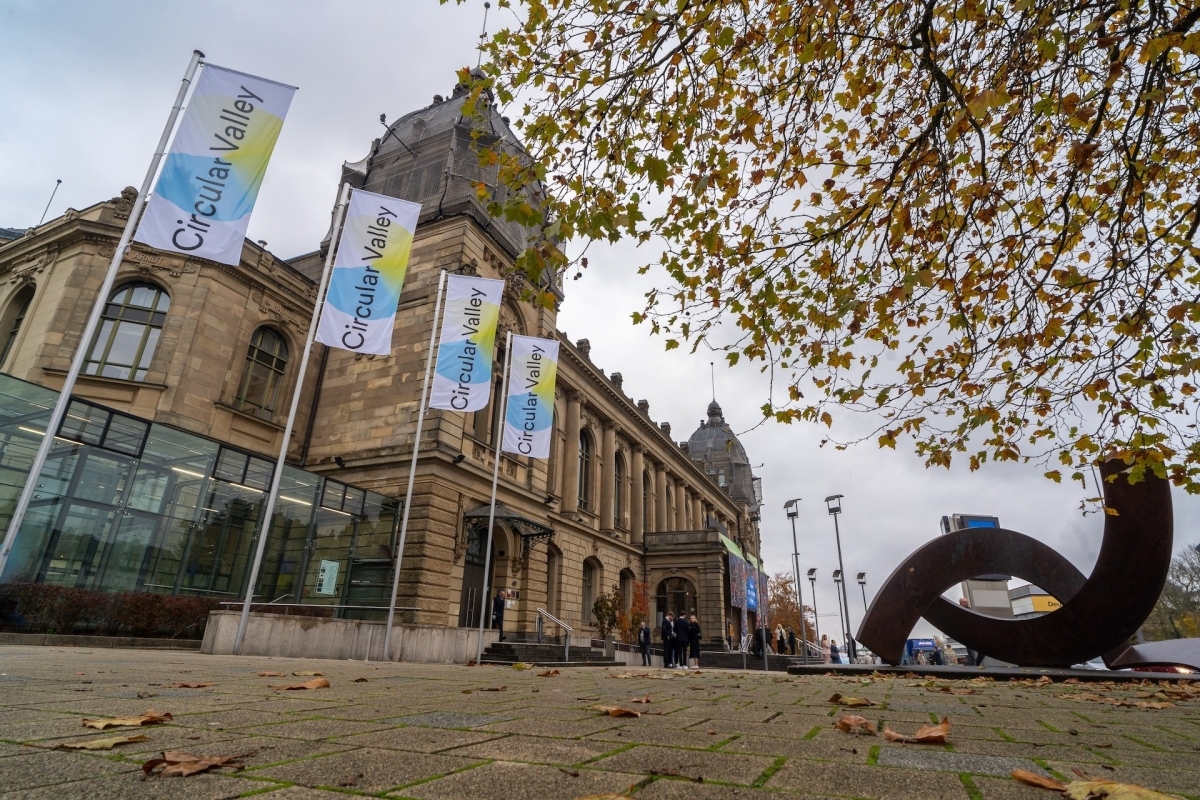The programme for the 2025 Circular Valley Forum has been finalised
24.10.2025The annual Circular Economy Meeting features exciting panel discussions and exchanges on relevant topics related to the circular economy. The highlight will be the signing of the joint declaration of cooperation between North Rhine-Westphalia, Flanders, and the Netherlands.
In mid November, the key players in the circular economy will once again gather at the Circular Valley Forum in the historic town hall in Wuppertal. The program for November 14, 2025, has now been finalized. “At the Circular Valley Forum, we will discuss the topics that are at the top of the agenda – with the latest insights into the most pressing issues in a changing world,” says Dr. Carsten Gerhardt, Chairman of the Circular Valley Foundation.
Dr. Thomas Stoffmehl (CEO Vorwerk SE) and Dr. Dorothee Becker (CEO Becker Group) will kick off the day. They will emphasize the close cooperation between the three regions and show how Circular Valley has become an international center for the circular economy.
In her opening keynote speech, North Rhine-Westphalia's Minister for Economic Affairs, Mona Neubaur, also highlights the role of North Rhine-Westphalia as a hotspot for the circular economy. Together with Wolfram Diener (CEO of Messe Düsseldorf), she sheds light on the development of the Circular Valley Convention as a platform for sustainable innovations.
 On November 14, 2025, the Historic Town Hall in Wuppertal will once again be the venue for discussions on the circular economy
On November 14, 2025, the Historic Town Hall in Wuppertal will once again be the venue for discussions on the circular economy
© Jan Turek/Circular Valley
Representatives from the trilateral region will provide an outlook on future cooperation
Dr. Thorsten Latzel, State Bishop of the Protestant Church of NRW, will then speak about the social significance of the circular economy, covering topics from ethical responsibility to the social aspects of sustainable transformation.
A European perspective follows in a discussion with representatives from Belgium, the Netherlands, and Germany. What role can the trilateral region play in the future of the circular economy? Susanne Hagenkort-Rieger (NRW), Bart Brosius (Flanders), and Arnoud Passenier (Netherlands) will show how the three partner countries are deepening their cooperation in order to act as the heart of the European circular economy.
Experts offer insights into the cycles of various industries
The topic block "Status of Industry: Opportunities and Challenges" illustrates the economy's strong focus on cycles. In the metals sector, Inge Hofkens (Aurubis), Dr. Heike Denecke-Arnold (Salzgitter Flachstahl), Bruno Pelli (Vale/Brazil), Dr. Ing. Paul Mählitz (DERA), and Dr. Gerhard Erdmann (Employers Association Steel) explain how to further increase recycling rates and efficiently recover valuable raw materials.
In the subsequent chemistry session, Koos van Haasteren (Chemelot), Inge Nevens (VITO), Bettina Kittel (NRW Ministry of Economic Affairs), Dr. Daniel Koch (LyondellBasell Germany), Prof. Regina Palkovits (RWTH Aachen University), and Prof. Dr. Manfred Renner (Fraunhofer UMSICHT) will discuss ways in which the chemical industry can transition from contributing to the problem to becoming a driver of solutions through the use of new raw materials, chemical recycling, and common standards.
Sigmar Gabriel, former Federal Minister for Economic Affairs and Energy and Federal Minister for the Environment, takes a look at the political and economic framework conditions. He talks about ways of reconciling ecological and economic interests.
Focus on cooperation across industries and national borders
Using the example of the closed loop for contrast agents, Dirk Stenkamp (TÜV Nord), Dr. Timo Flessner (Bayer Pharma), and Lia Vormans (Brightlands Circular Space) demonstrate how cooperation along the value chain works. This is a practical example of standardized quality and recycling in sensitive industrial sectors.
In the afternoon there will be a focus on the construction industry, where large material flows and regional cycles present unique opportunities. Together with representatives from North Rhine-Westphalia, Flanders, and the Netherlands, State Secretary Viktor Haase will present the results of the trilateral working group and announce the establishment of a competence center for circular construction.
The afternoon sessions will also explore topics such as cooperation between regional economic development agencies, the innovative strength of German companies, and the tech industry's contribution to the circular economy. Dr. Henrik Hahn (Evonik), Ulrich Ahle (Gaia X), and Dr. Yilmaz Alan (EY) will discuss the transparency that digital product passports create regarding material flows. Meanwhile, Dr. Henrik Ahlers (EY) and Jens Loschwitz (BDE) will discuss how Germany can transition from being a world champion of innovation to a champion of implementation.
Energy issues also play a central role: André Tünkers (Tünkers Group) and Prof. Ulrich Schurr (Jülich Research Center) show how renewable energies and agri-photovoltaics form the basis for a functioning circular economy.
The forum will be rounded off by several startup pitch sessions featuring young companies from Batch 9 of Circular Valley's Circular Economy Accelerator. These companies will present new approaches and technologies for closed material cycles.
The signing of the joint declaration will conclude the evening
The highlight of the day will be the signing of the joint declaration on cooperation between North Rhine-Westphalia, Flanders, and the Netherlands by Oliver Krischer (Minister for the Environment of North Rhine-Westphalia), Jo Brouns (Flanders), and Thierry Aartsen (Netherlands).
In addition to the panel discussions, there will be roundtable sessions where stakeholders and representatives can exchange ideas confidentially. "The forum thrives on the diversity of perspectives. This is where real 'cross-fertilization' takes place – participants pick up ideas from other industries and develop them further," says Dr. Carsten Gerhardt. In this way, the Circular Valley Forum helps take action across national and industry boundaries.
